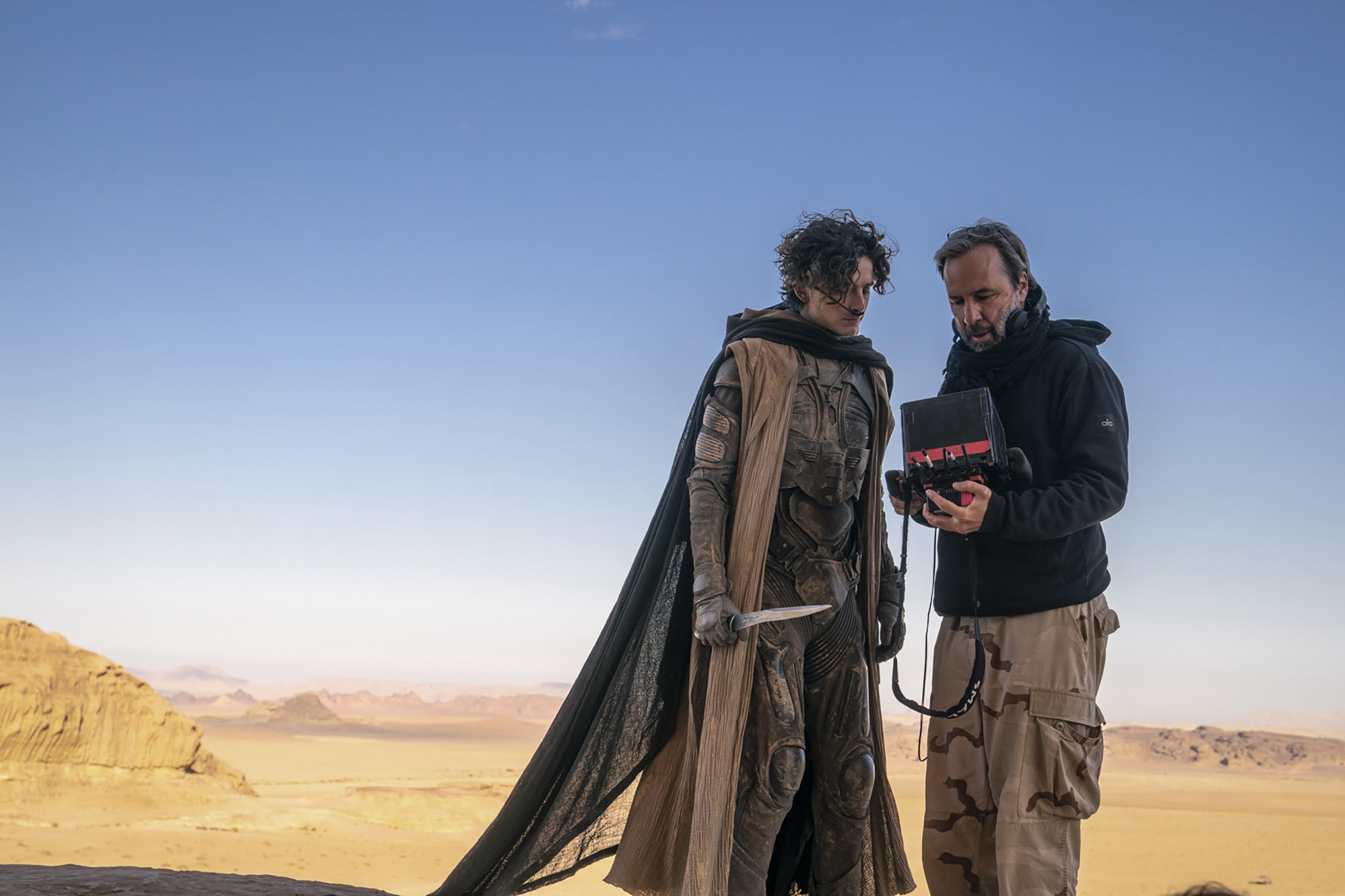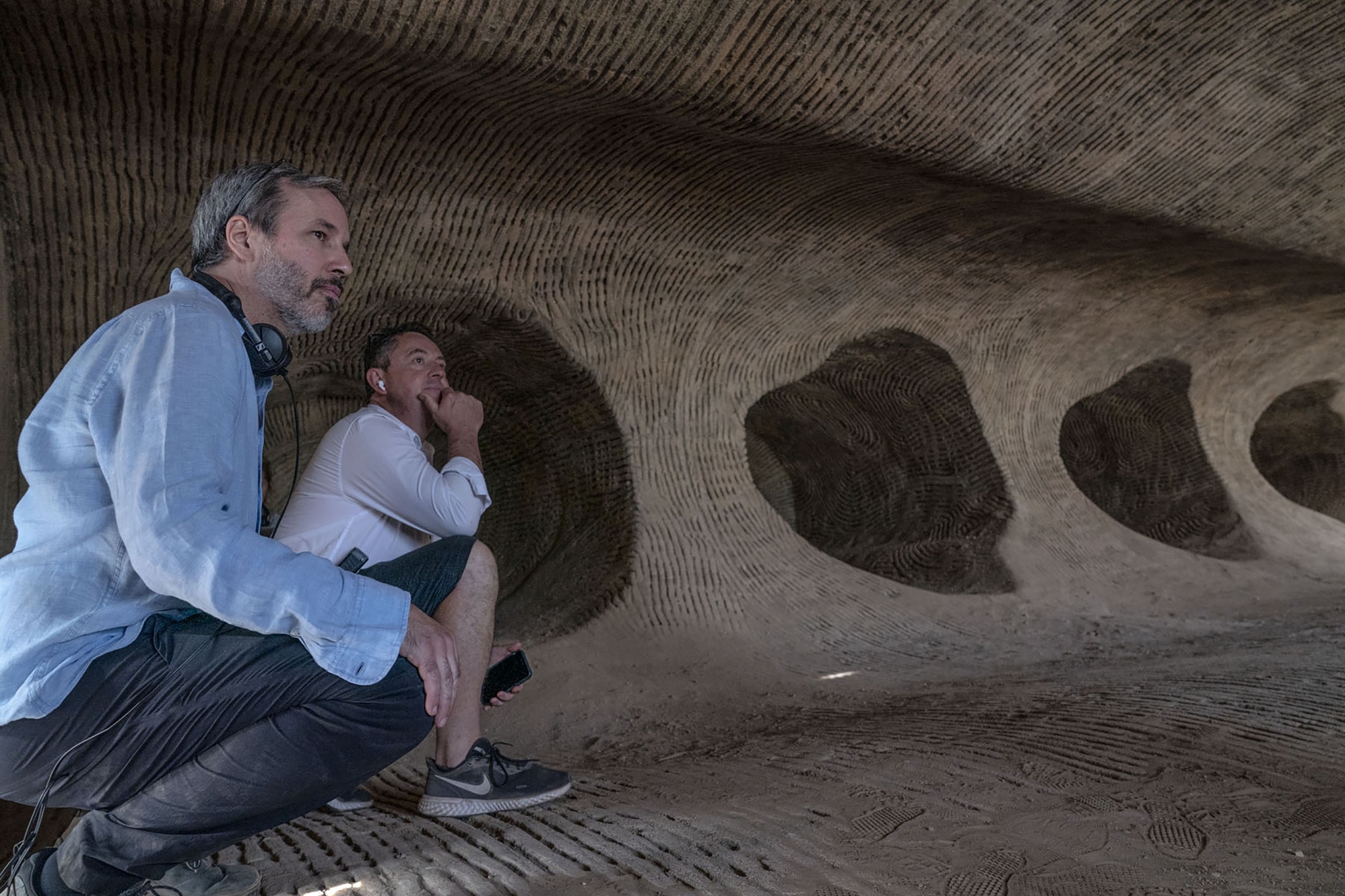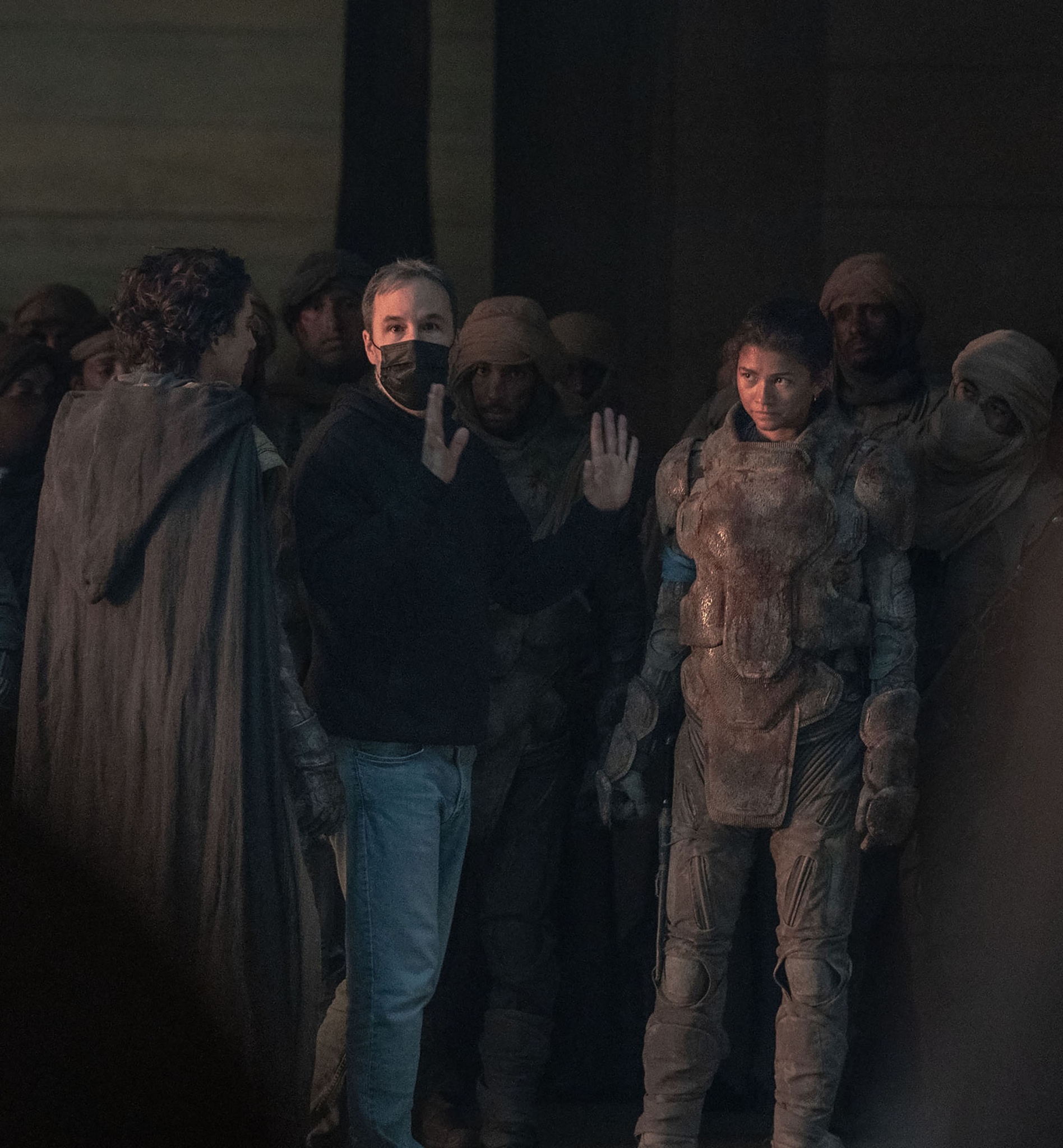

Denis Villeneuve has conquered Hollywood. But within his artist’s temperament is a desire to do things differently, everytime, and embolden his experience with new risks. Here, he shares his vision of cinema, and speaks honestly about the power of dreams.
“It’s always the same. These days go very fast, don’t they?” So says Denis Villeneuve, one of the world’s most famous filmmakers. He is sitting before me and speaking about Dune, now that the second part is being tipped for Oscar success and the third installment is in progress. “Distance is important. It’s important to have some time. I just finished something a few days ago, so now I’m in the process of having a couple of days away from the keyboard just to refresh and be able to read again. See how much of a mess everything is.” Unlike so many filmmakers of his stature (and there are few) Villeneuve still speaks about his work with a level of humility and a feeling that there is still much to learn. Dune has been a major part of his early life, too. The Canadian filmmaker first read Frank Herbert’s books when he was 13, and was moved by the idea of a boy finding home in a different culture. He still owns a copy of the French paperback edition, and it was a dream of his to put the story on-screen. Villeneuve settles into conversation and shares his thoughts with us; most notably on the power of dreams and a life after Arrakis.
CC: How often do you revisit the Frank Herbert books? They’re masterpieces of science-fiction, with intricate, but sometimes surreal, storylines that can be interpreted in many ways.
DV: I’m always in contact with the books. I keep them close to me and refer to them constantly. If there’s a problem or I’m facing something that doesn’t feel right, I go back to the book as a bible. There’s always a clue there that will spark an idea and help me find the solution. That’s what is so nice about making an adaptation: you have a map to help you navigate.
In Dune: Part Two (2024), I made certain changes because I knew that Frank Herbert was not satisfied with the way the first book was perceived. He wanted to correct the perception that it was a celebration of Paul Atreides and he wanted it to be a cautionary tale. So he wrote Dune Messiah (1969) in order to correct that. And so I did my adaptation closer to Frank Herbert’s desire than being true to the text. In fact, it was more faithful to his vision than the book is. I also agreed with the idea of it being a cautionary tale. But you make these decisions at the start of the process.
CC: What’s the biggest lesson you took from the second film, now that you’re preparing the third?
DV: I’ll be honest, I’m still digesting the process of making it. The truth is, in general, it takes me years to recover from a film. Because when you finish a film, it’s an accumulation of many things. You see where you improve yourself and where it was a victory, and where you failed. So to digest that, it takes time.
It actually takes me years to be able to watch the movies again. And it’s nice when there’s a moment you can return after having taken distance, in a way that makes you see it as the audience did. It’s a very strange process. And to be honest, I miss when I finished a movie and no one cares about what will be next, and I can just disappear under the radar. Writing is very vulnerable. I don’t like to talk about projects before they are made. I think it’s not healthy. So, yes—I’m happy to feel an appetite for a third one. And I have other projects I’m working on. When we did Dune: Part One (2021), it was released at the end of the pandemic, and there were a lot of restrictions. It was difficult to be in contact with the audience. When we released Part Two, it was a normal release, and I realised I underestimated the appetite for these films.

Timothee Chalamet and Denis Villeneuve on the set of Dune Part II.

Denis Villeneuve on the set of Dune Part II.
CC: You’ve been called a perfectionist by Zendaya. Can you give me some insight into your routine as a filmmaker?
DV: There’s a lot of preparation involved in each shot, and to bring the images that were a part of the initial dream when I wrote the screenplay and worked on the storyboard. I have this obsession with light, and so I work with cinematographers who are perfectionists, meaning that we are over-planning, especially on a movie like Dune. There’s incredible preparation to make sure the sun’s direction is perfect at a certain time. There’s a precision to the cinematography that I absolutely adore. I love it, and try to give my cinematographers as much firepower as possible. And with actors, it’s a balance between what the scene requires, too. Silence on set is also a major part of my process.
CC: Why is it so important for these films to be watched in theatres?
DV: The thing is, those movies are designed to be as immersive as possible, and you follow characters that are constantly feeling the shock of the impact of nature on the planet’s ecosystem. The idea is that your field of vision is absolutely filled with the image, and we also designed the sound to create something like a physical engine. The bass adds another layer of sensation that improves and increases the impact of the storytelling. And I think watching Dune at home and in the theatre is a completely different experience from an immersive point of view. And some movies are more intellectual. Movies like Dune are visceral. They are absolutely intended to be received in the theatre.
CC: People often refer to David Lynch’s version, but I wonder if you ever consider Alejandro Jodorowsky’s vision of Dune—the very first there was.
DV: I would love to meet Jodorowsky, I have never had the chance. We have a friend in common and I know that he is an alive and brilliant artist who I admire. I think his Dune adaptation would have been a fantastic Jodorowsky movie. Would it have been a good Dune adaptation? I don’t know—because he’s someone who resides in a very singular universe. I don’t know if he was interested in the book, instead of certain ideas in the book. I would’ve loved to see his movie, which was so ambitious. But if I meet Jodorowsky, I think I will definitely love to talk about the power of dreams and the power of the unconscious and the psycho-magic and all of these ideas to unlock the mind. I would love to speak with him about that—much more than Dune!
CC: Where does this interest in dreams come from?
DV: I’m obsessed with the idea that before we were born, we were dreaming. And when we’re going to die, will my last contact with this world be a dream or reality? And how do dreams help us cope with reality, and do dreams inform our true nature? All these ideas interest me.
CC: That’s very relevant to Blade Runner 2049 (2017). And a lot of your other works.
DV: These are recurring themes in my cinema. The problem I have with dreams and cinema is: the act of watching a movie is like an awakened dream in itself. And so to put dreams into a dream is quite tricky, and I was always reluctant to approach this—but I keep doing it. It’s really curious that I keep doing something I don’t like.

Denis Villeneuve on the set of Dune Part II.
CC: What do you think the explanation is?
DV: It’s a mystical force that I cannot abandon.
CC: You don’t refer to Dune as a trilogy. Why is this?
DV: The original idea was to do the first adaptation of this book in two parts. And to try to have language continuity similarities between both movies; have them echo each other and become an object. And the second one would be faithful to the first, trying to explore different ways of the same alphabet. But still, I see this as an entity. There was something healthy for me to say, OK, that’s finished. It’s over. And the only way to go back to Arrakis was to imagine a different movie, a different formal approach. I never did that before. I never revisited. When you think about Sicario (2015) to Arrival (2016), or Enemy (2013) to Prisoners (2013), there’s an aesthetic shock between movies. Now I’m facing the same subject. If people see it as continuity, they might be disappointed. It would really excite me if I was able to create a third movie that has its own identity and feels like something totally new. We’ll have to see how it comes out. But for me, as an artist, I must try something different.
CC: It sounds like you stick to a strict set of personal principles.
DV: I try not to take things for granted, and I try to put myself out of my comfort zone. I don’t succeed at that all the time. But I want to revisit the language and to approach things differently from one movie to the other. It’s difficult to go back into reflex. That’s where you feel secure. That’s the big challenge, always trying to be in some artistic danger. Flirting with disaster—it’s the only way. Otherwise the work is boring. The day I stop taking risks, I should stop making movies.
CC: Many films you’ve made have been risks. Blade Runner 2049, for example.
DV: I seriously thought, while doing Blade Runner 2049, that it could be my last film. That’s another rule that I didn’t invent: always make a film like it’s your last. That’s the thing I always do. Even Dune: Part One—I put all my energy into it as though there was never going to be a Part Two.
CC: Can you tell me about your storyboard process?
DV: It’s a very important process for me. I came to the cinema through storyboards. When I was a kid, I didn’t own a camera. And my best friend at the time was a very young, fantastic artist who could draw. I was not good with a pen but we developed stories and movies by drawing them, and I became very used to the process of creating an intimate environment with an artist and dreaming with this person. And many years ago, I found Sam Hudecki, who was an extension of my brain. Technically, he’s amazing. As a colleague said, I speak three languages: French, English, and Hudecki. I do sessions alone with Sam where I allow myself to dream out loud and develop the idea. Once the screen play is at a certain stage, I will storyboard the movie. The idea there is to go from words to the image and from the storyboards I will rewrite the screenplay. There’s a lot of ideas that come out while storyboarding. And it will define the rhythm, the approach, of the movie—more than the screenplay. It is about characters and sound. And with sound we can start to dream about the atmosphere of the movie. A film like Arrival, all the atmosphere, the darkness, the kind of Chinese shadows with the characters, was developed in the storyboards. From the start, there’s visual research that is mostly based on paintings or photography of the atmosphere I want to find. But sometimes you see an image out of context, in a museum, a shopping centre, or a subway station, and it grabs your attention. That’s OK. That’s the light; what I’m looking for. I’m in that period of my next project when I start to dream, so I try to stay away from the internet. I like the idea that it comes from the subconscious, or the spontaneous. It could be that picture on the table right now. That’s it.
CC: You began on micro budgets. When you finish Dune, do you intend to do something smaller?
DV: I have two or three projects that are in the incubator. Right now, I have the energy to do those bigger projects, but when I’m 75, and I’m still making movies, I’ll do the smaller ones. I have this stamina for big cinema, so I have no temptation to go back.
I’m known in my family to be a duck lover. I come from a family of duck hunters. And some of my most operatic, dramatic memories of childhood were going duck hunting with my father. One day, I will try to bring that on screen, the idea of a boat at dawn on the St Lawrence river with the violence of the gun, and the boat filled with blood. It was a very strong image for a tiny child, but I grew up eating duck, and I still love it.





